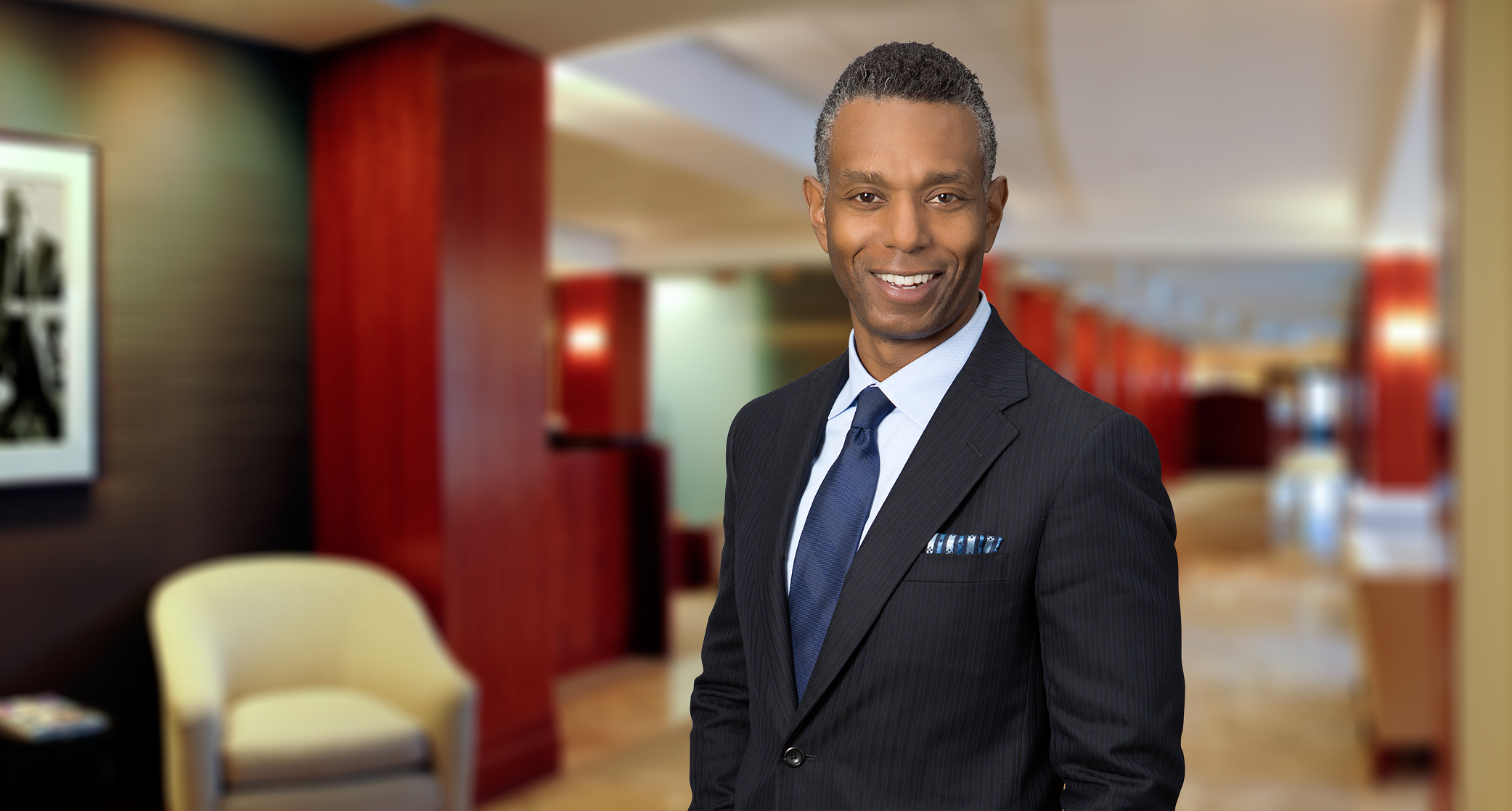Yes, It's News When Big Law Elects a Black Leader
Let's get real: Being a black leader of a top firm is Y-U-G-E.
October 11, 2017 at 09:33 AM
12 minute read

Irell & Manella has a new managing partner: Ellisen Turner. When I first read that news, I thought ho-hum. Another man for the top job. But then I glanced down at the page and saw Turner's photo, and my reaction was: Wow. He's African-American!
Anyone who pretends that she didn't react the way I did is, well, pretending. I know I'm suppose to do the P.C. thing and act like Turner's race is irrelevant. Which, I guess, is why a lot of the coverage about his elevation focused on his clients and previous roles on the firm's executive committee.
But let's get real: Being a black leader of a top firm is Y-U-G-E. (Irell & Manella ranked No. 1 on Am Law's A-list in 2016 and had $2.98 million in profit per partner.)
So I decided to go straight to Turner to talk about just that: race and how that figures in his career. Below is an edited version of our conversation.
It's a big deal for anyone to be elected head of a firm. But you must feel everyone is paying extra attention because you're the first black leader at this very elite firm. Do you feel the pressure?
For anyone—whether women or minorities—you feel this additional pressure. You don't want to fail that community. Even if someone says, “I don't feel that pressure,” there's pressure.
Are colleagues and friends saying things like, “You'd better not screw up.”?
No, it's more self-imposed. If you're part of a group, you know people are looking to you for success. You feel the pressure for the firm to do well, and you want to feed your family. But this is different pressure. My dad was one of the Norfolk 17 who integrated public schools in Norfolk, Virginia. I know what real pressure is like. And this doesn't compare to what my dad went through. They were spat upon, and people tried to stab them.
You're 41, and you're a generation away from legendary black lawyers like Ted Wells. Do you think you had a much easier time than your predecessors?
Absolutely. I know what their experiences were like. The original six black lawyers who made it in major firms—among them, Irell partner Henry Shields, O'Melveny partner Gil Ray and Skadden partner Michael Lawson—came out to LA because New York firms wouldn't hire them. It's better now because it's a different question. It's not whether you can be hired but how can you succeed.
So have you faced prejudice in your career?
Yes! I live in the United States, after all. When I was interviewing at firms, a partner invited me to go to the firm's box at a Lakers game. When I went showed up, one of the first things a partner there said to me was, “We have enough soda.” He assumed I was there to serve them. I didn't go to that firm. That attitude is there. There are people who have not interacted much with blacks, who can't imagine that a young black man could be a lawyer.
A lot of African-American lawyers get worn down by that kind of discrimination. So how did you make it?
I put a lot of work into law firm choice. I worked at three firms during the summers at law school. Irell came to my attention after I clerked. It was different in one respect: It's really small [160 lawyers] with complex matters and small teams. That one-on-one relationship means you're staffed in meaningful way, and it means they can't miss your talents—or your shortcomings. I could have been just a good a lawyer at another firm and be washed out.
Did you look at diversity when you were picking a firm?
I did. But if I only looked at stats, Irell might've ranked poorly because we're such a small firm. There was one black partner. I could have said that I wanted to go to a firm with more black partners, but you can't put that much weight on statistics. You can have champions who don't look like you.
You're also a rarity because you're practicing in the tech field. Do you think blacks face even more bias in tech?
Diversity in STEM is lacking. It can be a benefit because I stand out. When I go to an IP conference or to court for a patent case, people remember me. As long as you're good at what you do, it's beneficial to stand out.
And what happens if a minority messes up?
There will be implicit bias, and to some people the bias will be confirmed. If someone thinks a group won't perform well, the moment a member of the group makes a mistake, it becomes confirmation. The results are magnified—that's what women and minorities have to overcome.
Does that mean you never made any mistakes?
Of course I made mistakes, but the reaction of the partners was to teach me how to overcome it. And that's the kind of reaction you want. It has to be a culture where you are allowed to make mistakes and learn from them.
Do you think being a black leader of a major firm will still be news 10 years from now?
Ten years is a short time. If you said 50, it probably wouldn't be news. But given the last year or so, I'm not sure. Ten years ago, I didn't think a black man could be elected president. But I didn't think a man with no political experience could be president either. So I won't predict.
But I don't think we're in as bad a position as people think we are. I believe firms and companies are not just giving lip service to diversity. I believe they think diversity will lead to better outcomes. But they are not quite clear about the tools that will get it done. People are having serious conversations about diversity. You have might have setbacks, and some people—well-meaning people—will work against your goals. But even those setback open doors.
Contact Vivia Chen at [email protected]. On Twitter: @lawcareerist

Anyone who pretends that she didn't react the way I did is, well, pretending. I know I'm suppose to do the P.C. thing and act like Turner's race is irrelevant. Which, I guess, is why a lot of the coverage about his elevation focused on his clients and previous roles on the firm's executive committee.
But let's get real: Being a black leader of a top firm is Y-U-G-E. (
So I decided to go straight to Turner to talk about just that: race and how that figures in his career. Below is an edited version of our conversation.
It's a big deal for anyone to be elected head of a firm. But you must feel everyone is paying extra attention because you're the first black leader at this very elite firm. Do you feel the pressure?
For anyone—whether women or minorities—you feel this additional pressure. You don't want to fail that community. Even if someone says, “I don't feel that pressure,” there's pressure.
Are colleagues and friends saying things like, “You'd better not screw up.”?
No, it's more self-imposed. If you're part of a group, you know people are looking to you for success. You feel the pressure for the firm to do well, and you want to feed your family. But this is different pressure. My dad was one of the Norfolk 17 who integrated public schools in Norfolk,
You're 41, and you're a generation away from legendary black lawyers like Ted Wells. Do you think you had a much easier time than your predecessors?
Absolutely. I know what their experiences were like. The original six black lawyers who made it in major firms—among them, Irell partner Henry Shields, O'Melveny partner Gil Ray and Skadden partner Michael Lawson—came out to LA because
So have you faced prejudice in your career?
Yes! I live in the United States, after all. When I was interviewing at firms, a partner invited me to go to the firm's box at a Lakers game. When I went showed up, one of the first things a partner there said to me was, “We have enough soda.” He assumed I was there to serve them. I didn't go to that firm. That attitude is there. There are people who have not interacted much with blacks, who can't imagine that a young black man could be a lawyer.
A lot of African-American lawyers get worn down by that kind of discrimination. So how did you make it?
I put a lot of work into law firm choice. I worked at three firms during the summers at law school. Irell came to my attention after I clerked. It was different in one respect: It's really small [160 lawyers] with complex matters and small teams. That one-on-one relationship means you're staffed in meaningful way, and it means they can't miss your talents—or your shortcomings. I could have been just a good a lawyer at another firm and be washed out.
Did you look at diversity when you were picking a firm?
I did. But if I only looked at stats, Irell might've ranked poorly because we're such a small firm. There was one black partner. I could have said that I wanted to go to a firm with more black partners, but you can't put that much weight on statistics. You can have champions who don't look like you.
You're also a rarity because you're practicing in the tech field. Do you think blacks face even more bias in tech?
Diversity in STEM is lacking. It can be a benefit because I stand out. When I go to an IP conference or to court for a patent case, people remember me. As long as you're good at what you do, it's beneficial to stand out.
And what happens if a minority messes up?
There will be implicit bias, and to some people the bias will be confirmed. If someone thinks a group won't perform well, the moment a member of the group makes a mistake, it becomes confirmation. The results are magnified—that's what women and minorities have to overcome.
Does that mean you never made any mistakes?
Of course I made mistakes, but the reaction of the partners was to teach me how to overcome it. And that's the kind of reaction you want. It has to be a culture where you are allowed to make mistakes and learn from them.
Do you think being a black leader of a major firm will still be news 10 years from now?
Ten years is a short time. If you said 50, it probably wouldn't be news. But given the last year or so, I'm not sure. Ten years ago, I didn't think a black man could be elected president. But I didn't think a man with no political experience could be president either. So I won't predict.
But I don't think we're in as bad a position as people think we are. I believe firms and companies are not just giving lip service to diversity. I believe they think diversity will lead to better outcomes. But they are not quite clear about the tools that will get it done. People are having serious conversations about diversity. You have might have setbacks, and some people—well-meaning people—will work against your goals. But even those setback open doors.
Contact Vivia Chen at [email protected]. On Twitter: @lawcareerist
This content has been archived. It is available through our partners, LexisNexis® and Bloomberg Law.
To view this content, please continue to their sites.
Not a Lexis Subscriber?
Subscribe Now
Not a Bloomberg Law Subscriber?
Subscribe Now
NOT FOR REPRINT
© 2025 ALM Global, LLC, All Rights Reserved. Request academic re-use from www.copyright.com. All other uses, submit a request to [email protected]. For more information visit Asset & Logo Licensing.
You Might Like
View All
How a Paul Weiss Associate’s Career Took Off With Help From a Social Mobility Alliance
6 minute read

Trending Stories
- 1'Didn't Notice Patient Wasn't Breathing': $13.7M Verdict Against Anesthesiologists
- 2'Astronomical' Interest Rates: $1B Settlement to Resolve Allegations of 'Predatory' Lending Cancels $534M in Small-Business Debts
- 3Senator Plans to Reintroduce Bill to Split 9th Circuit
- 4Law Firms Converge to Defend HIPAA Regulation
- 5Judge Denies Retrial Bid by Ex-U.S. Sen. Menendez Over Evidentiary Error
Who Got The Work
J. Brugh Lower of Gibbons has entered an appearance for industrial equipment supplier Devco Corporation in a pending trademark infringement lawsuit. The suit, accusing the defendant of selling knock-off Graco products, was filed Dec. 18 in New Jersey District Court by Rivkin Radler on behalf of Graco Inc. and Graco Minnesota. The case, assigned to U.S. District Judge Zahid N. Quraishi, is 3:24-cv-11294, Graco Inc. et al v. Devco Corporation.
Who Got The Work
Rebecca Maller-Stein and Kent A. Yalowitz of Arnold & Porter Kaye Scholer have entered their appearances for Hanaco Venture Capital and its executives, Lior Prosor and David Frankel, in a pending securities lawsuit. The action, filed on Dec. 24 in New York Southern District Court by Zell, Aron & Co. on behalf of Goldeneye Advisors, accuses the defendants of negligently and fraudulently managing the plaintiff's $1 million investment. The case, assigned to U.S. District Judge Vernon S. Broderick, is 1:24-cv-09918, Goldeneye Advisors, LLC v. Hanaco Venture Capital, Ltd. et al.
Who Got The Work
Attorneys from A&O Shearman has stepped in as defense counsel for Toronto-Dominion Bank and other defendants in a pending securities class action. The suit, filed Dec. 11 in New York Southern District Court by Bleichmar Fonti & Auld, accuses the defendants of concealing the bank's 'pervasive' deficiencies in regards to its compliance with the Bank Secrecy Act and the quality of its anti-money laundering controls. The case, assigned to U.S. District Judge Arun Subramanian, is 1:24-cv-09445, Gonzalez v. The Toronto-Dominion Bank et al.
Who Got The Work
Crown Castle International, a Pennsylvania company providing shared communications infrastructure, has turned to Luke D. Wolf of Gordon Rees Scully Mansukhani to fend off a pending breach-of-contract lawsuit. The court action, filed Nov. 25 in Michigan Eastern District Court by Hooper Hathaway PC on behalf of The Town Residences LLC, accuses Crown Castle of failing to transfer approximately $30,000 in utility payments from T-Mobile in breach of a roof-top lease and assignment agreement. The case, assigned to U.S. District Judge Susan K. Declercq, is 2:24-cv-13131, The Town Residences LLC v. T-Mobile US, Inc. et al.
Who Got The Work
Wilfred P. Coronato and Daniel M. Schwartz of McCarter & English have stepped in as defense counsel to Electrolux Home Products Inc. in a pending product liability lawsuit. The court action, filed Nov. 26 in New York Eastern District Court by Poulos Lopiccolo PC and Nagel Rice LLP on behalf of David Stern, alleges that the defendant's refrigerators’ drawers and shelving repeatedly break and fall apart within months after purchase. The case, assigned to U.S. District Judge Joan M. Azrack, is 2:24-cv-08204, Stern v. Electrolux Home Products, Inc.
Featured Firms
Law Offices of Gary Martin Hays & Associates, P.C.
(470) 294-1674
Law Offices of Mark E. Salomone
(857) 444-6468
Smith & Hassler
(713) 739-1250










